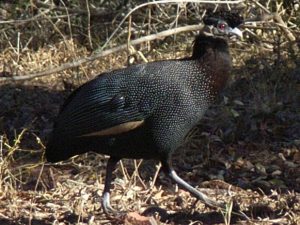
Image Courtesy of Wikipedia
Guinea Fowl Hatching
Guinea Fowl should be hatched the same way as chickens, ideally with a broody hen but if not available an incubator using the same heat and humidity settings as recommended by the manufacturer for chickens. The only difference is that the incubation period is slightly longer being between 25-26 days. On hatching the chicks should be kept under heat if not with a broody until 6 weeks of age and then they can be slowly integrated into an existing flock.
Housing and Runs for Guinea Fowl
Just like chickens they will require at least 1sqft of coop space per bird to sleep in. A chicken coop set up is ideal for them and they will perch if perches are available for them.
The main difference with Guinea Fowl is that the available run space needs to be greater than that for chickens with at least 2sqmt per bird, although they will not be as destructive to the ground as chickens so you could allow them to free-range in areas you would not allow your chickens due to their digging habits.
Guinea Fowl are also excellent flight birds and can easily clear a 6ft fence so if you need them to restrict to an area wing clipping on one side is a must.
Feeding Guinea Fowl
Feeding regimes for Guinea Fowl match those for chickens with chick or starter crumbs being given until 6 weeks of age, growers pellets until 16 weeks of age and then either layers or finishers pellets depending on whether you intend to keep the birds for eggs or feed them up as meat birds. Food should be given to them adlib and you also should make sure they have plenty of fresh water.
They do love worms and grubs and if the area they are in has been stripped it is best to give them treats in the early evening of mealworms or bugs to encourage their natural behaviour.
Guinea Fowl Health
Guinea Fowl carry fewer diseases than conventional poultry although they are susceptible to the usual suspects of red mite, ticks, worms and other parasites that can take hold in other poultry flocks. Checking the birds on a regular basis and watching out for unusual behaviour can help prevent these pests taking hold.
Setting up a basic health kit before getting them is a good idea so that you can prevent any problems as soon as you notice them:- Apple cider vinegar – add this to the water for five out of seven days once a month to help keep the gut in good working order;
- Red mite powder – dust the bedding with this to help kill off any mites and dust your fowl with it should there be a problem (check the package for suitability)
- Jeyes fluid – use this to clean to coop out fully once a week;
- Purple horse spray or antiseptic spray – this should be used if they peck at one another or get grazed or scratched to disinfect the area to stop infections;
- Approved poultry wormer such as flubenvet – the most common cause of soft eggshells is worms so your Guinea Fowl should be regularly wormed the same way as other poultry.
You should also make sure all your basic equipment is set up before your guinea fowl arrive:
- Coop and run;
- Feeder and drinker;
- Bedding materials such as hay, wood shavings or even newspaper for under perches to catch droppings;
- Layers pellets, poultry grit and corn for feeding.
Further Articles of Guinea Fowl
- A Guide to Guinea Fowl Hatching, Housing, Feeding & Health
- Guinea Fowl in the Back Garden – Keeping Guinea Fowl

